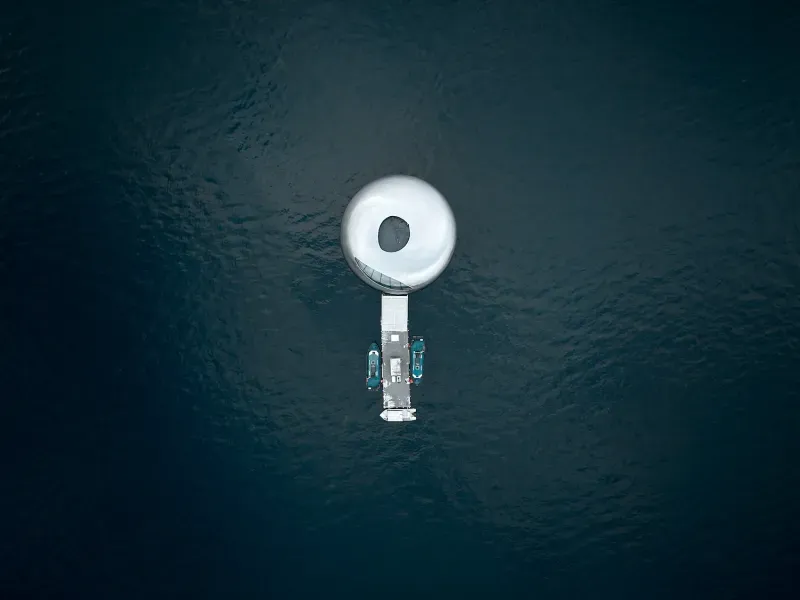Iris: the viral restaurant that’s located inside a floating art installation
In the heart of Norway’s Hardanger fjord, an extraordinary culinary experience awaits those willing to embark on a unique journey. Iris, an orb-shaped floating restaurant housed within the Salmon Eye art installation, combines ultra-sustainable seafood with immersive lessons in aquaculture, all while offering breathtaking views of the surrounding fjord and mountains. At Iris, every dining experience is meticulously designed to connect guests with the natural beauty of the fjord, the mountains, and the ever-changing elements. “Our location guides every step we take at Iris,” says head chef Anika Madsen. “We want our guests to experience the fjord, the mountains, and the ever-changing elements in the same all-encompassing way that we do every day. Here, we have the privilege of bringing our guests to the ingredients, instead of the other way around.”
Iris: the Journey Begins
The adventure starts in the picturesque town of Rosendal, where guests board an electric boat that ferries them across the icy black waters of Hardanger Fjord. The first stop is the chef’s boathouse on the island of Snilstveitøy, where a welcoming snack sets the stage for the evening. From there, guests proceed to the jetty of Salmon Eye, where the evening officially begins with a multisensory underwater experience.
Salmon Eye itself is an architectural marvel designed by Kvorning Design. As the largest floating art installation in the world, it serves a dual purpose: it’s an educational centre on sustainable seafood production and an avant-garde dining venue. Initiated by the family behind Eide Fjordbruk, the world’s first carbon-neutral-certified salmon producer, Salmon Eye aims to inspire and inform sustainable food practices. Once inside Salmon Eye, the dining room offers stunning panoramic views of the fjord and mountains, providing a mesmerizing backdrop for the 18-course tasting menu. Weather permitting, one of the courses is served outdoors over an open flame, enhancing the connection between the culinary experience and the natural environment.
Helming the kitchen at Iris is Danish chef Anika Madsen, who brings a wealth of experience from her time working under Heston Blumenthal at Dinner By Heston in London and as head chef at notable Copenhagen restaurants like Roxie and Fasangården. Madsen’s approach to cooking is deeply influenced by her commitment to sustainability and her passion for local ingredients. Her “hyper-local” menu delights the palate and raises awareness about sustainable food practices.
The dining experience at Iris is as exclusive as it is unique. With a price tag of 3,200 NOK (about £263) per person and a minimum booking of two, each meal is an individualized journey. Despite the high cost, the restaurant has already garnered a waiting list of over 2,000 people and is sold out months in advance. “We did not expect the bookings would go so crazy,” Madsen admits. “Even on the waiting list, they will always show up after two days. They are willing to travel far with short notice.”




The impact on future dining
Iris is not just a restaurant; it’s a glimpse into the future of dining and sustainable business practices. By integrating the dining experience with a deeper understanding of aquaculture and environmental stewardship, Iris sets a new standard for restaurant operations. It emphasizes the importance of sustainability, local sourcing, and education in transforming our food systems.
For those planning a visit, the closest international airport is in Bergen, from where a ferry service operates to Rosendal several times a day. Rosendal offers various accommodation options, such as Rosendal Fjordhotel and Rosendal Turisthotell. Private transportation can also be arranged upon request.
Iris offers more than just a meal; it’s a transformative experience that redefines fine dining. By seamlessly integrating with its natural surroundings and emphasizing sustainable practices, Iris provides a model for future restaurants aiming to positively impact the planet. The combination of innovative cuisine, breathtaking scenery, and a commitment to sustainability makes Iris a beacon for the future of the culinary world.


